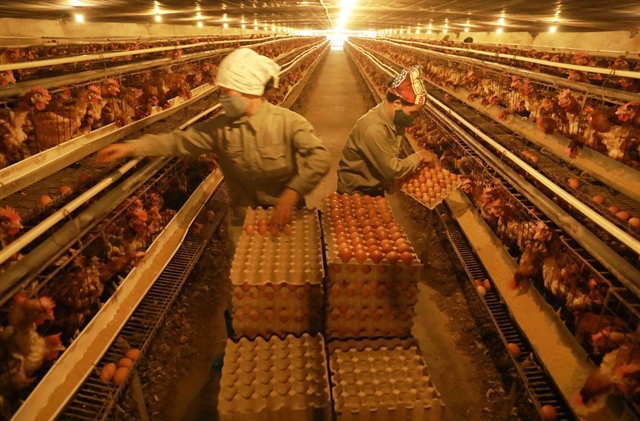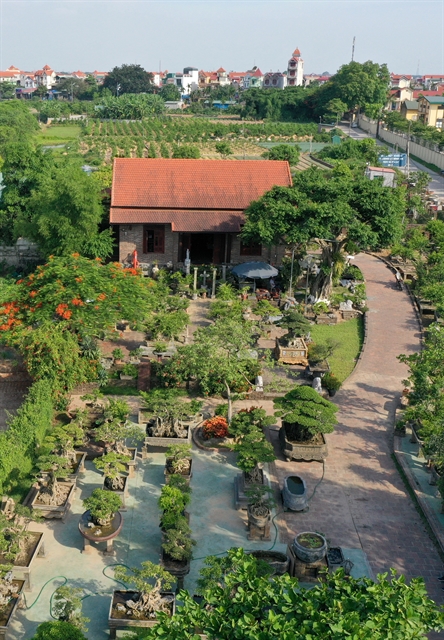
HÀ NỘI — In recent years, Hà Nội’s agriculture sector has created favourable conditions for organisations and individuals to develop the farm economy.
This model has contributed to the restructuring of the rural economy and helped farmers to utilise capital more efficiently, as well as apply scientific and technical advances to production for economic efficiency.
“Hà Nội currently has 1,759 farms, including 37 plantations, 1,410 livestock farms, 191 aquaculture farms, one forestry farm and 120 general farms,” said Nguyễn Văn Chí, Director of the Hà Nội Sub-department of Rural Development. “The farm economy in the city is concentrated, large-scale and sustainable. It also effectively promoted land resources, and investment capital and created many jobs for people in rural Hà Nội.”
The microbiological broiler farm of Nguyễn Thị Thoan’s family in the Sóc Sơn District, despite being greatly affected by the COVID-19 epidemic, is still developing.
On average, Thoan’s farm produces about 1,000 broiler chickens per month at a higher price than commercial chickens raised by traditional methods.
Since its development, Thoan has been aiming for a clean production process by using microbial products to treat the environment of the barn and building a closed production system from farm to table. Chicken products are slaughtered, packed, vacuum-sealed and labelled. Customers can easily trace the origin and evaluate product quality.
Having been aware of the trend of the food market, Nguyễn Trọng Long, Director of Hoàng Long Co-Operative in Thanh Oai District capitalised on and built the most modern pig farm in Hà Nội.
Long researched and developed a clean food chain from farm to fork called the A-Z food chain. This is a closed production chain from seed, feed, breeding, and slaughtering to preliminary processing, preservation, transportation and distribution. The chain daily supplies about three tonnes of pork and pork products to the market. 100 per cent of products sold are preliminarily processed, processed and packaged under the brand name “A-Z Food Chain”.
“The pig farm is compatible with VietGAP standards. In particular, the farm is implementing cool meat technology according to the Dutch VIP food chain,” said Long. “Currently, 40 per cent of the farm’s pork products are distributed to supermarkets and convenience stores, the remaining 60 per cent are distributed to schools inside and outside the district. At this time, the number of pigs on the farm has always remained at a stable level of over 4,000, creating jobs for more than 40 workers with an average income of VNĐ6 million (US$258) per person monthly”.

Đan Phượng is one example of farm models bringing high economic efficiency. In the district, there are 25 farms in Phương Đình, Thọ An, Trung Châu communes, of which there are 23 pig farms, one chicken farm and one cow farm with an average production value average VNĐ4-5 billion (US$172,000-215,000) per farm. This not only creates regular jobs for local workers, but the farm economy also creates favourable conditions to manage the supply of agricultural products for the market and trace the origin and origin of products.
“To encourage the development of the farm economy, Hà Nội needs a preferential loan policy from the Farmers Support Fund or the Agricultural Extension Fund”, said Hoàng Chí Dũng, Head of Sóc Sơn Economic Division. “Hà Nội also needs to create favourable conditions for people to accumulate land to develop concentrated farms. Along with that is to support joint activities to consume goods and agricultural products for farmers.

Director of the Hà Nội Department of Agriculture and Rural Development Chu Phú Mỹ said: “Hà Nội in the future will focus on developing various types of farm economy according to the supply chain, combining with the development of eco-tourism and education projects associated with the consumption of agricultural products and craft village products, contributing to the growth of the agricultural sector.”
“The Hanoi Department of Agriculture and Rural Development will advise the city to develop mechanisms and policies to encourage investment in the development of large-scale farms, value chain production, and industrial application with high technology and create safe, quality products with high economic value and sustainability. At the same time, we will implement production plans to ensure food safety and hygiene; registration for protection of trademarks associated with product traceability; encourage and create conditions for efficient farms to develop into co-operatives and agricultural enterprises.” — VNS
- Reduce Hair Loss with PURA D’OR Gold Label Shampoo
- Castor Oil Has Made a “Huge” Difference With Hair and Brow Growth
- Excessive hair loss in men: Signs of illness that cannot be subjective
- Dịch Vụ SEO Website ở Los Angeles, CA: đưa trang web doanh nghiệp bạn lên top Google
- Nails Salon Sierra Madre
 VnExpress News The News Gateway of Vietnam
VnExpress News The News Gateway of Vietnam





